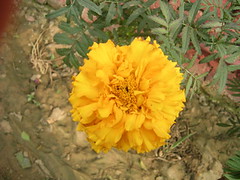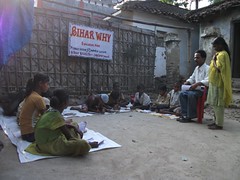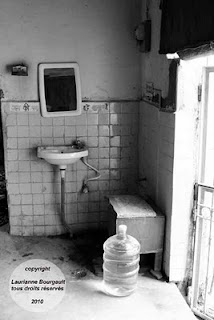by Anuradha Bakshi | Jun 16, 2010 | Uncategorized
Bhopal is in the news.. again! This time it is not just the terrible tragedy that changed the lives of over half a million people in its aftermath but the other side as well: the cover up, the sell out, the dark games and more shocking revelations. What is disturbing is the disconnect between the real human tragedy and the flimsy excuses made for all the blunders: be it the failure to clean up the site or the escape of the main accused.
One thought one had become inured to almost everything as one does live in a land called India! But I could not believe my eyes, years, mind when I saw/heard our Environment Minister quipping: I have held that waste in my hand, I am still alive and not coughing. This after he visited Bhopal last year and was asked about the delay in cleaning up. And wait there is more. He also observed that the greenery around the abandoned premises was better than most other places. He asked if it would have been (so green)… “with all the toxicity around”. But that is not all: he announced that the centre would help in creating a memorial to the tragedy, one that would cost 116 crore, more than the amount needed to supply clean drinking water to the area. “It will be a national monument built in the memory of those who lost their lives in the tragedy,” he said, “and a reminder of the mistakes that were made so that they are not repeated.” I found this in an incisive article entitled Those who still go unpunished!
The article ends by stating that perhaps the envisaged memorial should have statues of all the politicians responsible for the aberrations of the last 26 years.
Bhopal is in the news again. And out comes the can of worms. When the terrible tragedy occurred 26 years ago there were no 24/7 news channels, no investigative journalism and all we got were the headlines in papers and the well filtered bulletins on the sole national TV channel. Then over the years small new items, rarely front page ones, informing all of the progress of the judicial process and maybe the protest of the almost voiceless victims. It is only last week that it all came tumbling out making us aghast and angry. We are suddenly privy to the political games, the judicial ones, the corporate ones and the diplomatic games and sadly once again what is enfolding in front of our bewildered eyes is a new cover up game. So committees will be formed and will give their reports and then what…. A few coins will be again handed out with the hope of shutting disturbing and annoying voices and the dark games will carry on.
The games that have been played for the last 26 years are beyond any sane imagination. A very comprehensive article appeared this week in a leading investigative magazine. Read it. It shows how for a few pieces of silver, every thing that is remotely good, fair, human, humane was sacrificed with impunity. How justice was subverted and how even today nothing has changed. The betrayal of hundreds of thousands of voiceless and hopeless victims is so huge that in the words of a leading activist all you can do is laugh helplessly. This activist was a young university student who had gone to Bhopal in 1984 as a relief worker. He never came back and became the voice the desperate victims so needed. I salute Satinath Sarangi. If there were more such children of India, things would be different. But a lone voice, however strong, however brave and however committed does get lost and silenced in the cacophony that has played louder and louder in the last 26 years. What is needed even today to redress the torts, to bring some solace to those who have suffered for so long is many such voices so that all dissonant voices can be silenced once for all. Otherwise all appeals for justice will turn into helpless laughter.
The victims have another reaction while some crushed and defeated wish they too had perished on that fateful night, others ask whether it would have been better if they had picked up a gun! Is this the last resort our democracy offers its people? When all fails – administration, justice, politics – is death the only option?
The writing is again on the wall but are we man enough to stop and read. I know this innocuous blog is not going to make a difference, but I have to write it because I am angry, because I too feel let down, because I want answers and because I have stopped and heard. And also because I have seen first hand how time and again the poor and voiceless get used and abused.
As I write these words, a bunch of politicians are sitting in a huddle trying to set matters right. I wonder what new clean up game is being invented. Somehow I find it hard to believe that justice will finally be delivered and the real culprits made accountable.

by Anuradha Bakshi | Jun 8, 2010 | Uncategorized
 Not so long ago the nooks and crevices of our house were regularly home to sparrow nests. At that time we often consider this invasion a nuisance though we never destroyed any. I cannot remember exactly when the sparrows stop nesting. I cannot even remember when we actually stop seeing any sparrow at all. But come to think about it it has been a long time since one has laid eyes on that tiny bird, one that once was an intrinsic part of our lives. When a friend told me that new urban designs were responsible for the disappearance of the sparrow, I accepted the fact quietly and learnt to live without our little friends. It was one more instance of man versus nature and man had won again.
Not so long ago the nooks and crevices of our house were regularly home to sparrow nests. At that time we often consider this invasion a nuisance though we never destroyed any. I cannot remember exactly when the sparrows stop nesting. I cannot even remember when we actually stop seeing any sparrow at all. But come to think about it it has been a long time since one has laid eyes on that tiny bird, one that once was an intrinsic part of our lives. When a friend told me that new urban designs were responsible for the disappearance of the sparrow, I accepted the fact quietly and learnt to live without our little friends. It was one more instance of man versus nature and man had won again.
Last week an article in a magazine brought back my little sparrow to life. It seemed that it was not architectural designs but cell tower radiation that had spelt the death knell of not only sparrows but of bees and other creatures. The article makes frightening reading. The cell towers with seem to be proliferating on the skyline with obsessive regularity seem to be the cause not only of the disappearance of little creatures, but of illness and death in human beings. EMR (electromagnetic radiation) seems to have invaded our cities and homes and we are helpless.
In the span of a short decade the cell phone, which was once the prerogative of the rich, has become an essential commodity for all. Look at people walking on the streets, every second one has a cell phone. I was surprised to find out that everyone that works in my home has a cell phone, the maid, the cook, the gardener. Our washer man who comes once a week has one too and so does the plumber, the electrician and everyone who rings the doorbell be it the courier boy or the delivery man of the local grocery store. Look some more, children of all age are proud owners of cell phones. And to meet this exponential growth in demand, cell towers have mushroomed everywhere. For many allowing a cell tower on one’s roof is simply added income. According to the survey done by the magazine even hospitals and schools have offered their rooftops to house cell towers. One can safely say that we are in the throes of a new invasion!
And yet there was a time not so long ago when we managed without them. I belong go the generation that grew up with one fixed phone in the house. Often, as was the case at home, the lone phone was placed in neutral space like a corridor. The phone had a short lead wire and I remember how one use to try and tug at it to get behind a door for those private phone calls that are the prerogative of every teenager. That was the only privacy one got. I also remember how one paced the corridor at particular moments of the day so as to be the one who picked up the phone, or how one glared at anyone else on the phone if that was the time one was expecting a call. The lyrics of an old favourite come to mind: Time it was, and what a time it was, it was , A time of innocence, a time of confidences, Long ago, it must be, I have a photograph, Preserve your memories, they’re all that’s left you (Bookends, Simon and Garfunkel). Come to think about it I have no photograph just fading memories.
I also remember the advent of the cordless phone and how it spelt an new kind of freedom. Never mind if there was a limit of a few meters, one was freed from having to pull and tug at a wire. When the first cell phone came it was way beyond every one’s reach and we all looked at it with some kind of wonder. We could have never thought that in the span of a few years
everyone would own one.
Bees are not your irksome insect that needs to be shooed away. Their hum is a comforting reminder that all is well on planet earth, that the plants will be pollinated in time and food will reach our table. The silence of bees is frightening and the harbinger of terrible times.

by Anuradha Bakshi | May 30, 2010 | Uncategorized
 Charity needs to be sustainable was the headline of a recent article in a leading magazine. Needless to say it caught my eye and I hastened to read it. It was an interview with a top honcho, a lady at that, who shared her view about CSR about charity. For her charity was a redundant term because it is a ‘one-time’ gesture and unsustainable. More power to you lady! I read on and could not but smile as once again it seemed our tale of forgotten biscuits was being revisited.
Charity needs to be sustainable was the headline of a recent article in a leading magazine. Needless to say it caught my eye and I hastened to read it. It was an interview with a top honcho, a lady at that, who shared her view about CSR about charity. For her charity was a redundant term because it is a ‘one-time’ gesture and unsustainable. More power to you lady! I read on and could not but smile as once again it seemed our tale of forgotten biscuits was being revisited.
Ms Bali wants to make her biscuits healthier by fortifying them so as to fight rampant malnutrition ‘covertly’. Hence everyone who consumes the biscuits made by her company, and they are consumed by a large cross section of society, would be ‘healthier’! As she says: Our products are available throughout India. And, by fortifying them, if we are making them accessible to a large mass of people, we are not solving India’s malnutrition problem, but we are contributing to alleviating it. That is what she means by social corporate sustainability a new mantra I presume. Good wishes to her. I will not debate the issue here as this is not the aim of this blog. CSR has always been my ‘bete noire’ and I am yet to comprehend its true motives. I do wonder how enriching biscuits that are then sold amounts to CSR. But I agree with Ms Bali on the fact that charity has to be sustainable and not a one time gesture.
When we sought help to launch and sustain our nutritive biscuits programme, targeted mainly at the beggar children of our city, we were hoping to address the child beggar issue by making the business of begging non-sustainable. If one gave a biscuit instead of the expected coin maybe the handlers and mafia would look for other more lucrative ways. In the bargain you also gave nutrition; a real win-win situation. But sadly it did not work out for reasons I am yet to fathom.
The same happened with our rupee a day programme where we hoped to tap in the one perennial resource of our land: the numbers of people. What we asked was something that each and everyone could part with as one rupee got you nothing, not even a cup of tea. The idea was to make everyone a donor and make everyone participate in bettering the morrows of others. And it seemed so doable as all we were looking for at that time was 4000 such donors. In a land of a billion it seemed simple. But again we failed. And again I do not know why. It seemed so logical.
This has been my battle for 10 long years, a battle I am still nowhere near winning. Right from the outset, when I was handed over my first donation, I knew that this was just a temporary phase and that we would have to look at long term sustainability. The idea of depending on others is neither acceptable nor feasible. Planet Why still seems very elusive as we wait for the expert validation. And where it to go our way, the whole project is daunting in more ways than one. The other side of the spectrum is the tried and tested corpus fund, something I have always abhorred. But has not pwhy been a personal journey of getting over my own bete noires. What is at stake is too precious: the morrows of children and their dreams. So help me God!

by Anuradha Bakshi | May 26, 2010 | Uncategorized
 When Ruchika’s tormentor was handed over a laughable sentence some months back, the nation was outraged. Television channels were replete with debates on the issue and everyone wondered how the matter would end. It had taken many years to nail the elusive perpetrator and all one got was a suspended sentence and a paltry fine that any one could pay. I too had vented my anger and sadness in a blog entitled will I be safe tomorrow!
When Ruchika’s tormentor was handed over a laughable sentence some months back, the nation was outraged. Television channels were replete with debates on the issue and everyone wondered how the matter would end. It had taken many years to nail the elusive perpetrator and all one got was a suspended sentence and a paltry fine that any one could pay. I too had vented my anger and sadness in a blog entitled will I be safe tomorrow!
Today, six months later, the high profile molester is behind bars. he has been there for a week and will spent at least three more weeks there. The law has caught up with him in spite of all his contacts, his connections and the power he once yielded. That it took over two decades is another matter. It took a public campaign to get him nailed. When young Ruchika was molested there was no 24 hour TV, no activism, no public outcry. The family could just knock at various doors that failed to open. And battle lines were drawn with one side playing dirty. The family was humiliated and scorned. The young girl took her life. Justice remained blind. Even today the accused is behind bars not for having caused the child’s death, but for having molested her. Whether he will pay for the bigger crime remains to be seen.
There are millions of Ruchika who suffer in silence every day. They often lock themselves and loose the key. They know that they will not be heard, believed , let alone protected and vindicated. They are far too aware of the reality that surrounds them. They know the might of the adversary and what is often worse is that they often have to continue sharing the same space as most of such cases are perpetrated within the so called safety of one’s home. They just suffer in silence and try to perfect the art of becoming invisible, living in fear day after day. How does one protect such children? How does one protect the little girl abused by a kin? Who will ring the bell for her?
I hope that Ruchika’s case will help us open our eyes. I hope parents and caretakers will begin to look with their heart and see the reality as it is. That they will reach out to the child who sometimes slowly and almost imperceptibly begins to ‘change’. That they will find the time to listen and believe and not be swayed social or other pressures. Till that day does not come little girls will never be safe from lurking predators who prowl secure in the knowledge that no one will dare challenge their power.

by Anuradha Bakshi | May 15, 2010 | Uncategorized
 BiharWhy! An incongruous and curious name. And yet this the one C has chosen for a the brand new education centre located in a little village in Bihar’s Supaul District. I must admit quite sheepishly that when C had murmured: to go to the village in Bihar and start a branch of pwhy after my long an exasperated diatribe, I had not believed him though I had lauded his intention and offered all support. Imagine my surprise when I got an email from C last week telling me that BiharWhy had been launched. The mail also had some pictures attached.
BiharWhy! An incongruous and curious name. And yet this the one C has chosen for a the brand new education centre located in a little village in Bihar’s Supaul District. I must admit quite sheepishly that when C had murmured: to go to the village in Bihar and start a branch of pwhy after my long an exasperated diatribe, I had not believed him though I had lauded his intention and offered all support. Imagine my surprise when I got an email from C last week telling me that BiharWhy had been launched. The mail also had some pictures attached.
I sat for a long time looking at the pictures and slowly imbibing their stupendous meaning. The open air class, the little white mats on the mud floor, the lovely children and their teacher. It was a dream come true. I could not believe that something I had always held close to my heart had seen the light of day.
When one had taken the decision to only employ people from within the community to steer project why, notwithstanding qualifications et al, there was a covert reason: the hope that one day these very people would take ownership of the programme and take it back to their place of origin. That is why we had employed young people who had left their villages and come to the city in search of a better morrow. C was one such person. When he came to us with his half baked degree from Bihar and some vague skills (fine and art and electrical work!) we employed him to teach the primary children. Over the years C honed his knowledge, took extra classes and graduated to teaching secondary children as well as repairing broken fuses and painting the odd signboard! At that time he seemed set to continue as a teacher with pwhy for a long time. But that was not to be.
When we posted him to another centre he refused the move quite vehemently and I must admit that it was a shocker. I could have reacted as violently and dismissed him for dereliction of duty, but I have always been quite fond of this young man and even if that was not the case, the spirit of pwhy did not allow me the luxury of that decision. This was another why to be answered, a loud one that was a portent of things to come. So I gently proffered some options, one being to take back all he had learnt with us to his village. The seed had been sown. Time would tell whether it would take roots. If it did, then my absurd dream of reverse migration would have been fulfilled.
BiharWhy has seen the light of day. It is a reality today with over 50 children getting access to better education. C surveyed the area, met parents, the local authorities and everyone that mattered. Having been ‘in the city’ for almost a decade has paid as he is somewhat looked upon as the prodigal son that has returned. Everyone was willing to listen to him and wanted him to share his experiences and knowledge. So when he suggested he start a centre like the one in Delhi everyone was a taker.
But this is only the first step. The acid test is yet to be passed. BiharWhy has to survive and thrive and stand on its own. The road is along and not without obstacles. Bihar is not an easy place to operate in and had its own set of whys that will need to be tacked with caution. C will have to battle the administration, the local political power and the complex social problems with patience and determination.
I shared all my concerns with him as I know how difficult it is to survive and thrive! I told him of all the things we had done wrong in the hope that we would not make the same mistakes but it would be foolish to think that things will be easy. I juts hope and pray that he succeeds.
Note: C needs help and support. So of you think this brave venture is worth it, do lend a hand.

by Anuradha Bakshi | May 7, 2010 | Uncategorized
 The house is strangely empty. Just a few days back it had been filled with strangers of all shades and hues. There were people everywhere: plumbers, masons, painters, electricians, carpenters almost an invasion! It had been rather irritating at first as we got pushed out of our space with alacrity and almost banished to a little corner but somehow I had got used to it and I must say in hindsight quite enjoyed the novel experience. My days were ruled by the motley crew of workers and I had learnt to live with it. The first lot arrived by 8.30 and then by 10 am the house was buzzing with noise and activity. I was often called to one floor or the other t
The house is strangely empty. Just a few days back it had been filled with strangers of all shades and hues. There were people everywhere: plumbers, masons, painters, electricians, carpenters almost an invasion! It had been rather irritating at first as we got pushed out of our space with alacrity and almost banished to a little corner but somehow I had got used to it and I must say in hindsight quite enjoyed the novel experience. My days were ruled by the motley crew of workers and I had learnt to live with it. The first lot arrived by 8.30 and then by 10 am the house was buzzing with noise and activity. I was often called to one floor or the other t o sort some problem or the other: where to place a pipe, was the colour right, where did I want a shelf put and so on. Time flew till the house got empty by 6pm, that was on days when the workers did not decide to do ‘a night’, which meant that they would be in till midnight.
o sort some problem or the other: where to place a pipe, was the colour right, where did I want a shelf put and so on. Time flew till the house got empty by 6pm, that was on days when the workers did not decide to do ‘a night’, which meant that they would be in till midnight.
I must admit there were moments when one got a little irritated, but these were few and far apart. When not needed I found myself ambulating around the house simply watching the men at work. As I had written earlier, I was amazed by the happy mood around. Not withstanding heat or dust, no one complained, quite the contrary, they found time to laugh and joke or sing. Many had their own songs on their cellphones and they often sang along joyfully even if they were out of tune. Sometimes work stood still and you wondered why till you discovered the workers praying in a corner: it was namaz time! You simply tiptoed away.
At times I found myself shuddering with fright at the sight of a frail worker with a load of bricks trying to get across the wobbly wooden planks that led from one roof to the other, or when one worker hung precariously on the jhoola (sort of swing) painters use to paint high walls. I often walked away, too scared to watch.
There were a few young workers, but as I had written earlier, I had made my peace with the curious case of child labour. I just hoped and prayed that they would one day graduate to becoming masons and then who knows, small time contractors though I wished I could have taught a modicum of the 3 Rs so that they would not make the mistake their contractor Murtaza did. You see Murtaza must have begun his career just like them, at a very young age. Today he takes small contracts. In our case he had to tile the roof and had quoted a price. When the work was completed he was forlorn. He had under quoted and made a loss of a couple of thousands of rupees. He admitted the fact sheepishly and I simply smiled and handed him the missing amount. He was elated. In other places he would have had to take the loss, one he could not afford.
Slowly the house that had at one time looked like having been quaked, started to fall in place. And then came the day when the plumbers and then the carpenters and then the masons declared they had finished and walked away. Only the painters were left and they too would soon move outside. An eerie silence filled the once buzzing space and though everything looked pristine and new, it was almost as if the place had lost its soul, albeit temporarily. I realised that from this day on there would be no music and song, no laughter and chiding, no prayers in the corner. I knew that I would have to learn once again to live in my space, one I had shared with a band of merry men who could teach one the art of surviving with a smile.
Strange but true: I miss my workers!











